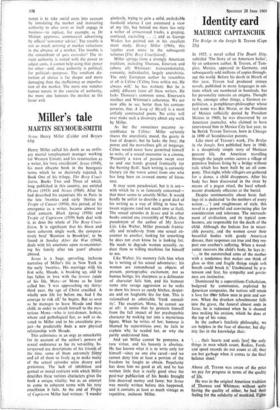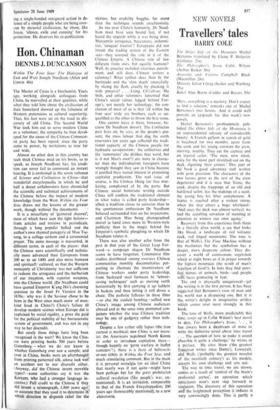Identity card
MAURICE CAPITANCHIK
In 1925, a novel called The Death Ship, subtitled 'The Story of an American Sailor', by' an unknown author, B. Traven, of Tam- pico, Mexico, appeared in Germany, and subsequently sold millions of copies through- out the world. Before his death in March of this year, Traven had produced sixteen novels, published in many languages in edi- tions which are numbered in hundreds, but his personality remains an enigma. Thought to be, amongst other things, a German ex- politician, a pamphleteer-philosopher whose real name was Ret Marut, or the President of. Mexico (officially denied by President Mateos in 1960), he was discovered by an American journalist, who claimed to have interviewed him in Mexico City last year, to be Berick Traven Torsvan, born in Chicago in 1890 of Scandinavian parents.
Like most of Traven's work, The Bridge in the Jungle, first published here in 1940, is a deceptively simple story of Mexican peasant life. An American travelling through the jungle comes across a village of primitive Indians living by a bridge without rails which has been built by an oil com- pany. That night, while villagers are gathered for a dance, a child disappears. After his body has been discovered in the river by means of a pagan ritual, the local school- master drunkenly officiates at the burial.
Despite sentimentality about basic feel- ings (it is dedicated 'to the mothers of every nation ... ') and roughnesses of style, this novel is a powerful and convincing plea for consideration and tolerance. The encroach- ment of civilisation, and its typical care- lessness, are responsible for the death of the child. Although the Indians live in miser- able poverty, and the women cover their beautiful bodies with gaudy American chesses, their responses are true and they res- pect one another's suffering. When a wood- cutter recovers the child's body, he lays it: ... in the outstretched arms of the mother with a tenderness that makes one think of glass so thin and fragile that single soft breath could break it.' Unobscured by re- tension and fear, his sympathy and gentle- ness are instinctive.
• Dominated by a superstitious Catholicism, badgered by communists, exploited by 4lnerican companies, the natives still retain a love for Mir fellow men in pain and sor- row. When the drunken schoolmaster falls into the grave, the funeral almost ends in farce; he is redeemed when he is shamed into making his oration, which he does at the top of his voice.
In the author's fatalistic philosophy, we are helpless in the face of disaster, but dig- nity lies in the knowledge that: . . their hearts and souls [are] the- only things in man which count, Radios, Fords, and speed records do not count at all; they are but garbage when it comes to the final balance sheet.'
Above all, Traven was aware of the price we pay for progress in terms of the quality of life.
He was in the original American tradition of Thoreau and Whitman; without quite having the quality of either, he had their feeling for the solidarity of mankind. Fight-
ing a single-handed rearguard action in de- fence of a simple people who are being over- run by material civilisation, he chose, like Joyce, 'silence, exile and cunning' for his protection. He deserves his re-publication.



































 Previous page
Previous page